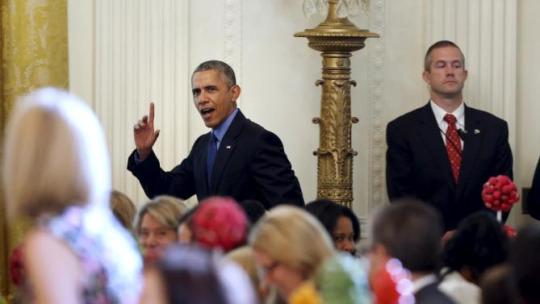
President Obama arrives to join first lady Michelle Obama (not pictured) to welcome children to a Kids’ State Dinner at the White House. (Photo: Jonathan Ernst/Reuters)
President Obama will use his clemency power to release dozens of inmates from federal custody this week, doubling the commutations he’s granted so far and reassuring advocates that he is serious about using his executive authority to free people serving long decades for nonviolent crimes.
If the president grants another 40 or so commutations as expected, he will have shortened the sentences of more prisoners than any president since Gerald Ford, who extended clemency to thousands of Vietnam draft dodgers. (Obama’s record on pardoning ex-convicts outside of prison, however, has remained stingy by historical standards.)
The commutations will be granted during a criminal-justice-heavy week for the president. On Tuesday, he addresses the NAACP’s annual conference in Philadelphia, where he will speak about the need to reform mandatory minimum sentences for nonviolent crimes, which disproportionately affect men and women of color. On Thursday, Obama will travel to El Reno prison in Oklahoma, becoming the first sitting president to tour a federal prison, according to White House spokesman Josh Earnest. The president will also give an interview to VICE magazine at the prison, on his criminal justice reform efforts.
Last year, the Obama administration made a historic call for applications from prisoners serving more than a decade in prison for nonviolent crimes that would have been prosecuted less harshly today. Obama is expected to shorten the sentences of hundreds of these prisoners before he leaves office, though the White House maintains there is no set number of commutations. The president has shown a special interest in people sent away for decades for crack cocaine violations, which were punished 100 times more harshly than powder cocaine until Congress scaled down that gap in 2010.
Obama may cross paths with one such prisoner seeking his clemency when he visits the federal prison in Oklahoma on Thursday. Douglas Dunkins, 49, has served more than 20 years of a life sentence at El Reno for dealing crack cocaine. (If Dunkins had been convicted of dealing the same amount of powder cocaine, his sentence would have been 20 years.) The judge in Dunkins’ case expressed discomfort with the mandatory minimum laws that forced him to put a 26-year-old with no prior felonies on his record in prison for life.
“It troubles me to think that you at your age [are] going to have to spend the rest of” your life in prison, the judge said then. “It troubles me a lot.” The ACLU is representing Dunkins’ petition for clemency and has written about his case.
The president’s historic call for petitions from prisoners has not gone off without a hitch. First of all, the response has been overwhelming. More than 30,000 federal inmates filled out a survey saying they wanted to request clemency. The Justice Department asked private lawyers to volunteer to represent inmates pro bono, and a coalition of advocacy groups called Clemency Project 2014 is now organizing the effort to match lawyers with applicants they believe meet the Obama administration’s requirements. The group has screened out about 13,000 of the 30,000 who responded as not eligible. These prisoners still may apply directly to the pardon attorney if they like, but will not receive a pro bono lawyer.
The coalition got off to a slow start, and has only sent about 50 completed petitions to the Justice Department’s Office of the Pardon Attorney so far. Cynthia Roseberry, who leads Clemency Project 2014, said this pace soon will quicken because the group’s lawyers will have faster access to the court documents they need from the Bureau of Prisons.
Advocates involved in Clemency Project 2014 are heartened by news of the president’s decision to reduce the sentences of even more prisoners this week.
Roseberry called the grant “tremendously encouraging.”
“It encourages us to continue plowing through the ones we have,” she said.
Julie Stewart, the president of Families Against Mandatory Minimums, one of the groups in Clemency Project 2014, said she thinks the size of the grant shows the president is serious about using his clemency power.
“I think if he only did eight or 10 it would sort of convey a lack of commitment, but I think by doubling down he’s showing a serious commitment of his promise of providing relief to people who have no other option,” Stewart said.
Obama’s own actions suggest how deeply invested he is in his power to grant presidential mercy: In his last round of commutations a few months ago, he sent each soon-to-be-released prisoner a personal letter. (The letter was Obama’s idea, and was drafted by him, according to a White House aide.)
“I am granting your [clemency] application because you have demonstrated the potential to turn your life around,” Obama wrote to each prisoner. “It will not be easy, and you will confront many who doubt people with criminal records can change.”
“I believe in your ability to prove the doubters wrong,” the president said.
